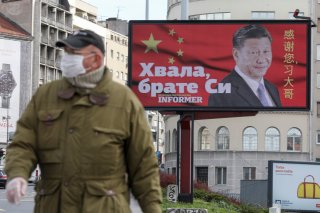This Is How Xi Jinping Is Capitalizing on the Coronavirus
China’s past economic growth was closely tied to the privatization of state-owned firms and started in response to a perceived crisis of legitimacy.
COVID-19 has placed unprecedented stress on the Chinese economy, and private sector firms, in particular, feel the pressure. As part of its usual playbook, the Chinese Communist Party (CCP) is trying to boost economic growth through state organs, but doing so will come at the expense of private enterprises. This is consistent with General Secretary Xi Jinping’s favoring of state-owned enterprises and broader centralization of power. The pandemic provides a unique opportunity for stealth nationalization of the economy.
Government seizures of private firms predate COVID-19. As early as 2011, the Chinese government nationalized producers of rare-earth metals, consolidating 31 mostly private enterprises into Bao Gang Rare Earth, a single government-owned monopoly. Another prominent example is China Banking and Insurance Regulatory Commission’s (CBIRC) takeover of Anbang Insurance in February 2018, which reappeared two years later as Dajia Insurance. The government also nationalized 44 strategic technology enterprises, partly in response to US-China trade disputes.

This trend continues as the Chinese economy struggles through the pandemic. Last month, the CBIRC took control of four insurers, two trust firms, and three securities companies to ensure “stable operations” of the firms. China’s state-run news agency, Xinhua, reports that the takeover will last for one year and the firms will continue normal operations under CBIRC’s care. However, the CBIRC can easily change the terms or extend the period of the takeover, especially if the economy continues to struggle. These companies may never return to private operation.
Another COVID-19 related takeover is the Hainan provincial government’s “rescue” of HNA Group in February 2020. Although HNA’s financial troubles long predate the pandemic, the virus hit the conglomerate’s core airline business when passenger figures dropped by 91 percent compared to mid-February 2019. Hainan appointed an executive chairman for the company and set up a working group consisting of municipal officials, the civil aviation authority, and China Development Bank, a state financial institution. Analysts expect that authorities will force HNA to sell off businesses and pay off debt.
The Chinese government has allegedly taken over major N95 mask producers. While the takeover was done under the guise of quality control concerns, the seizures allowed the Chinese government to secure masks for domestic use and for its foreign policy priorities (such as gaining favor with Europe and Russia through donating and selling masks). But the move has implications for the United States too, as American buyers can no longer purchase masks directly from the factories and instead must buy them through middlemen. There is no reported timeline for these companies resuming independent operations.
Airlines are already mostly state-owned, but the industry faces further consolidation. One proposal involves some of the nation’s biggest (state-owned) carriers absorbing smaller (private) ones suffering from the collapse of travel. Another option is for the government to inject billions of dollars into the industry, similar to its bailout of regional banks like the Bank of Gansu. Either proposal will give the CCP more leverage over private firms.
China’s past economic growth was closely tied to the privatization of state-owned firms and started in response to a perceived crisis of legitimacy. In this crisis, the decision to nationalize private firms is yet another indicator that Xi Jinping is more interested in his personal power than in developing the economy. What happens next will confirm Xi’s intentions. Temporary intervention during the pandemic is one thing, but does the state then retreat when the situation stabilizes? If not, Xi will have established even tighter control over China.
This article was first published by the American Enterprise Institute in August.
Image: Reuters

